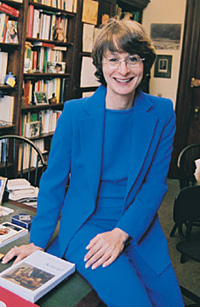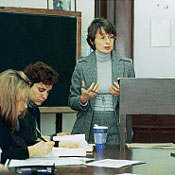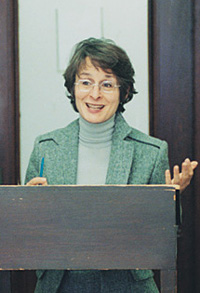|
|
 |
 |
 |
 |
|
COVER STORYA Passion for TeachingBY SHIRA J. BOSS ’93
Kathy Eden, one of Columbia’s prized teachers of the Core Curriculum, knows her Greek and Latin. During her Literature Humanities class in Hamilton Hall, she frequently turns to the blackboard and writes out the Greek words for concepts encountered in the Iliad and the Odyssey, then promptly transliterates and translates them. Following a faculty lecture that Eden recently gave at her alma mater, Smith College, she answered a question by not only citing the relevant text but reciting it, from memory, in Latin. For a lecture on the history of Western verse for her “English Literature, 1500–1600” course, Eden begins by unspooling the opening lines first of Virgil’s Aeneid, then Beowulf — in Old English — followed by Dante’s Inferno and finally Chaucer, all without a glance at notes. “It was mind-blowing,” says Heather O’Donnell ’93, who took that class and now is a post-doc fellow at Princeton. Eden is one of the few professors who have commanded both Literature Humanities and Contemporary Civilization. She is the outgoing chair of Lit Hum and chairs the Committee on the Core Curriculum. A Renaissance scholar, Eden was a Guggenheim Fellow, and her third book, Friends Hold All Things in Common: Tradition, Intellectual Property and the Adages of Erasmus (Yale University Press, 2001), recently won the Roland H. Bainton Prize for Literature from the Sixteenth Century Studies Conference. Given her many talents in and out of the classroom, other universities have attempted to lure Eden for teaching and administrative positions. In addition to the classical languages, Eden speaks French, Spanish, Italian, German and some Japanese. Not that she has ignored English — she memorized Hamlet when she was 15 and still loves to quote from it. “She is not just a scholar. She has a breadth of mind,” says Wm. Theodore de Bary ’41, John Mitchell Mason Professor Emeritus of East Asian Languages and Cultures. Eden is a popular professor who makes undergraduates her priority, takes a genuine interest in their lives and has won all the most coveted teaching awards Columbia has to offer: the Great Teacher Award (1998), given by the Society of Columbia Graduates; the Mark Van Doren Award (2001), selected by a committee of students; the Distinguished Service to the Core Curriculum award (2001), presented by the Heyman Center for the Humanities; and a Presidential Teaching Award (2002), bestowed by the University for teaching excellence. Eden’s commitment to the Core Curriculum made her a natural to receive one of the first Core chairs when they were established. “It’s the most challenging teaching,” Eden says of the Core courses. “I’m never as exhausted coming out of any other class.” Despite her reputation and demonstrations of being an intellectual powerhouse, Eden inspires rather than intimidates her students. “She is extremely modest,” O’Donnell says. “She is focused on her work and not the politics of getting ahead or public intellectualism.” Michael Bérubé ’82 was Eden’s student shortly after she came to Columbia in 1980, fresh out of graduate school at Stanford, where she earned a Ph.D. in comparative literature. “Kathy Eden teaches the kind of course you remember for the rest of your life,” says Bérubé. The daughter of a surgeon and a homemaker, Eden grew up on Long Island. “I always knew I was going to be a teacher,” she says. Along with her language studies, she majored in English and classics at Smith and fell in love with Greek poetry. “I was a library groupie,” she admits.
When Eden was a freshman, she talked her way into a senior seminar in the religion department taught by Karl Donfried ’60. When Donfried’s son, Mark ’96, later turned up in Eden’s Lit Hum class, Donfried recalled that she had been an outstanding student. He became curious as to just how well she had done in that seminar, one of the toughest that he teaches, and he went back through his grade books. “She had been the best student in the class,” he rediscovered. Eden’s program at Stanford was extremely competitive — it admitted only three or four students per year. When Eden graduated, she had multiple job offers but chose Columbia, which, when she applied, she hadn’t realized was all-male. The first course she taught was on Renaissance literature. “It was 84 men and me,” she says. When Eden started at Columbia, she was assigned to teach Core classes, like everyone else. But instead of grumbling, she embraced the classes. One reason that faculty sweat the Core, and often avoid it when they can, is because such wide-ranging courses can be among the hardest to teach. It is impossible for any one person to be an expert in every text in the curriculum, and many faculty feel more comfortable sticking to what they know best. “The tendency is for faculty to be hired for their specialty, and they more or less need to have their arms twisted to take on general education,” de Bary says. Eden is an exception. “I think about intellectual ideas over a long time frame, which is why the Core appeals to me,” Eden says. She adds that she appreciates the communal nature of the Core and that one advantage of her committee work is that she gets to meet people from other departments and broaden her understanding of the material. More than two decades later, Eden still devotes much of her time to undergraduates and sees the Core as a precious opportunity. “I fall in love with my classes year after year,” Eden says. “Kids that age are through with their bodily growth and have the greatest mental growth. You get them at a time when their mental horizons just open up. It must be what a pediatrician feels seeing a growing child year after year. I love that. I find it to be a really exciting time.” The College’s brand of student adds to her joy. “The best Columbia students are very intellectual,” Eden says. “They’re feisty, a number are counter-cultural, and they don’t accept what I tell them unless it makes sense to them. They don’t just absorb.” Eden prides herself on catering not just to the literature lover but to all students. “She definitely bridges the gap” between the literature and non-literature students, says Zach Rosner ’04. “One of the most involved people in our class was an engineer.”
“You have students with different abilities to read and write and with different sensitivities,” Eden says. “You have them for four hours a week in a room, and your job is to interest all of them in a collective conversation. That can be challenging.” One way Eden finds common ground is by focusing on the underlying structure of works, for example, Homer’s way of introducing a theme and then repeating that theme in various contexts. “I’ve had students who are physics or math majors really turned on to Homer or the Symposium because they see the beauty in the structure,” Eden says. “Although they don’t think of themselves as literature students, they appreciate recurring patterns.” In Lit Hum and CC, as the best professors do, Eden does not aim for specific knowledge of the texts as much as an appreciation of their ideas and arguments. Whether students like a particular story or text is not immediately relevant, she says. “I care about that less than a lot of people probably do. Understanding has to come before evaluation.” Yet liking the process of reading and learning is something that Eden wants to instill in her students. “It’s my job to teach them the great pleasures of reading,” she says. “I don’t know what they think reading is, coming out of high school, but I hope they come around to finding it an activity that gives them a great deal of pleasure and understanding.” One way Eden accomplishes this is by keeping classroom discussions rigorous but relaxed. She looks out at the students through rectangular glasses and stray strands of her brown and gray bangs that fall to the bridge of her nose. “We don’t know if Homer wrote these two poems,” she says offhand of the Iliad and the Odyssey. “We don’t even know who Homer was.” She segues to the structure of the poems, which she points out is so similar that whoever wrote them — and one gets a sense that she doesn’t care who — likely is the same person. Eden uses a lively Socratic method of teaching, where students come to their own conclusions through her leading questions and pointers. She spikes the fast-paced discussion with encouragement (“Good for you!” “Excellent!”) and delights when students pick up on key details (“You guys are really fantastic, you’re really reading carefully!”). She avoids cold-calling, but catalogues raised hands in her head and gives students the floor by pointing and prompting with an eager “Hello?” With her disarming way of speaking in the classroom, she says of Odysseus, “We’re told that he’s an incredible hunk.” Eden explains that one reason he eventually left Calypso and her promise of immortality is because the story is about achieving immortality through honor. “Nobody is going to write an epic about a man who stays with a nymphet and has great sex forever,” Eden says. “He’d lose honor — kleos,” she says, using the Greek word for glory, with which the students are now familiar. Eden draws rave reviews from students, who no longer get to choose their Lit Hum sections but are assigned to one before they arrive on campus their first year. Those who get Eden count themselves as lucky. “She’s probably the best teacher I’ve had so far at Columbia,” says Rosner, a history major and pre-med student. “There was a lot more to be drawn from the texts than I expected. We always started class with our thoughts, then she’d take our ideas further and spur us toward a more specific understanding of the texts.” Although Eden has a literature background, she alternates Lit Hum with periods of teaching CC. “It’s never good to do the same course without breaks,” she says. “It’s easy to get into a rut and become complacent.” After taking a leave for the 2003–04 academic year, Eden plans to return to CC for a couple of years and is especially eager to enhance her understanding of some of the writers covered in the second semester, such as Marx and Freud. “My experience with CC already has enriched my understanding of the texts in Lit Hum,” she says.
Undergraduates in Eden’s other courses, including “The Renaissance in Europe” and “Literary Criticism From Plato to Kant,” are equally impressed. Even her lecture classes are run interactively. Eden uses her engaging style to shrink a room full of students until it feels like a seminar, says Luke Leafgren ’01. “Her classes are exciting,” says Leafgren, who is completing his second bachelor’s at Oxford as a Kellett Scholar. “She’s very sensitive to her audience. She leads us to discover for ourselves what’s special about the texts we were reading instead of lecturing to us.” “I’ve never met anyone who combines such a profound depth of learning in the Renaissance and in classical antiquity with such a keen sense of humor,” says Bérubé, the Paterno Family Professor in Literature at Penn State. “When I was 20, Kathy Eden seemed to be an intellectual exemplar. Now that I’m 41, I have to say that I was right at 20, and I don’t often have occasion to say such a thing!”
Eden’s appeal extends beyond the classroom. While colleagues know her as businesslike, and friends call her a private person, students have a different impression. “She is an involved and caring teacher. She understands the various stresses of college, and she’s always interested in what’s going on with her students,” says Rosner, whose Lit Hum section has arranged reunion dinners that Eden has attended. Eden isn’t strict about her office hours, accepting visitors liberally. When a student comes to confer with her, Eden is known for pulling up her chair knee-to-knee with him or her and leaning in with her full attention. Once a student came to her door wanting to get into her CC section. It turned out she wasn’t teaching it that semester, but instead of turning him away, Eden invited him to sit down and discuss his experiences with Columbia and with the Core. Beyond ministering to students on campus, Eden is the mother of two daughters, Emma (15) and Anna (12), and is treasured as a loyal and generous friend. “She is utterly committed to the people she’s close to,” says Ann Van Sant, who teaches English and comparative literature at UC Irvine and who became friends with Eden when they both taught in Columbia’s English department in the ’80s. Eden has interwoven her intellectual and private pursuits, Van Sant says. “She’s always thinking. She never takes a break from high intellectual activity.” She prefers word play to conventional humor, and finds it therapeutic to work on footnotes. Eden’s sensitivity and whole-hearted involvement in intellectual life make her a valued administrator on campus. She works on several committees in addition to her Core positions, among them the Academic Review Committee and the Tenure Review Committee. “She has a good sense of where you can find common ground among people with opposing views. That’s a very important skill to have,” de Bary says. “Her gifts as a scholar and teacher are unusual. When you combine that with her administrative abilities, you have a rare phenomenon,” says Karl Donfried, who two years ago asked Eden if he could nominate her for the presidency of Smith, an offer she eventually declined. Leafgren, who plans to pursue an academic career, says he has been inspired by Eden. “Some [texts are] about education and arguing that literature educates better than history or philosophy because it creates an image the reader can emulate and be inspired and motivated by,” he says. “I think Professor Eden is an image of an exemplar of teaching.”
|
|
|||||||||||||||||||||||||||||||||||||||||||||||||||||||||||||||||||||||||||||



